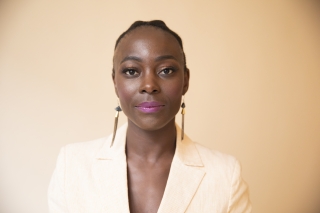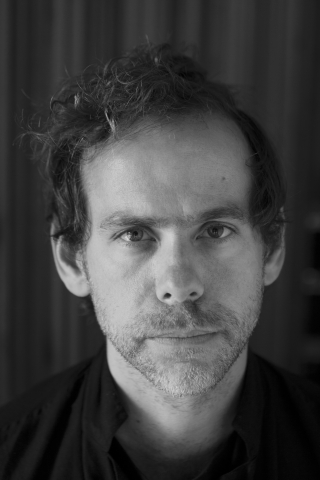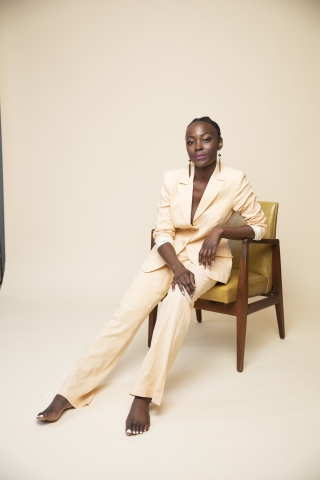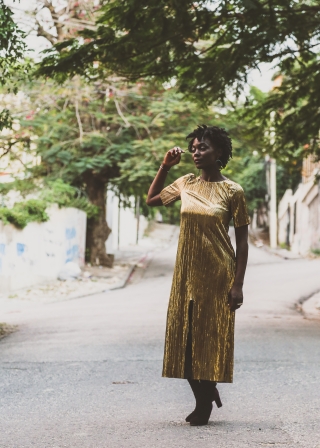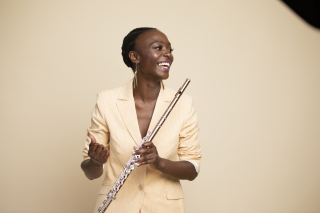How did you get your start in music? Who inspired you the most?
Music has always been such a huge part of my life, and I really credit my grandmother as being the beginning of that story. We had a unique way of connecting… We spent countless hours together in her yard in Haiti, sitting under the mango trees in her yard, singing and making up songs together. She would ask me to tell her about my day or tell her about something that was on my mind, but through song. And what I didn't recognize at the time was that, for us, as Haitian people, music was the way of preserving our history.
Through this loving exchange between us, my grandmother brought me into this centuries-old practice of storytelling through song and music, and I credit her for igniting the young composer and improviser in me, and for being the first person to reinforce that sharing my voice, wholly and honestly, through music is something that I should always really honor and cherish.
Joachim’s most recent touring project, Fanm d’Ayiti, is an evening-length work for flute, voice, string quartet and electronics that celebrate and explore her personal Haitian heritage. Commissioned and developed in residence through St. Paul Chamber Orchestra’s Liquid Music series, Fanm d’Ayiti was recorded with Chicago-based ensemble Spektral Quartet. The work, released in 2019 on New Amsterdam Records as Joachim’s first featured solo album, received a Grammy nomination for Best World Music Album, and will make its orchestral debut in 2022 with the Oregon Symphony, where Joachim currently serves as an Artistic Partner.
Tell us about Fanm d’Ayiti and what it meant to you to honor your culture, your grandmother, and be recognized for it by the Recording Academy?
My journey to Fanm d’Ayiti started in late 2015 shortly after the passing of my grandmother. Her absence ignited a deep desire for understanding in me. In what ways did our voices connect with the voices of other Haitian women? What did our songs tell us about our past, and what might they mean for the future? So, Fanm d’Ayiti was the first project for me where I really, truly felt that I embraced my entire identity within that work as a Black woman, as a Haitian American, and as a 21st century creative thinker and artist. To not only have it be well received by my colleagues, but to get the Grammy nod was really something… It confirmed that my grandmother was right! That sharing exactly who you are, and doing so unapologetically and honestly, is the very best way to be received.
How did your partnership with Bryce Dessner come about?
I first learned about Bryce while I was working for the Brooklyn Youth Chorus—he was commissioned to write a piece for them. I knew of him through his band The National, so I remember thinking, “I thought that this guy was in a band. And now I'm hearing some of his concert music, and it's exciting stuff!” Soon afterwards, he was commissioned to write new work for Eighth Blackbird, just as I was joining the ensemble, and so I got to play some of his music in a chamber setting. And that relationship also evolved from the classical to indie rock. We worked together on a beautiful record with Bonnie “Prince” Billy, in which I got to sing in addition to play flute with him.
Bryce and I share this mutual versatility, where we're not hamstrung by genre, where we are excited about all of the intricacies and technical prowess of classical music. And yet we both come from other traditions that involve communal music-making. So, when he first wrote to me about this residency, I was excited to be involved. I have appreciated Bryce's curation and his ability to have his ear to the ground and be excited about what might come next from an artist.
Your work tends to honor truth and history. How does that factor into the work that you will be developing around your engagement at the YSC?
So much of my work now has become connected to place and honoring the history of spaces in many ways, but also to be able to transform spaces into something new. This opportunity to unveil this new iteration of the Schwarzman Center in this way intrigued me. What does it mean to actually create a piece that's very specific to the space itself? What does it mean to transform this space into a sonic environment for a unique experience here? And so, I hope to honor this place in that way.
